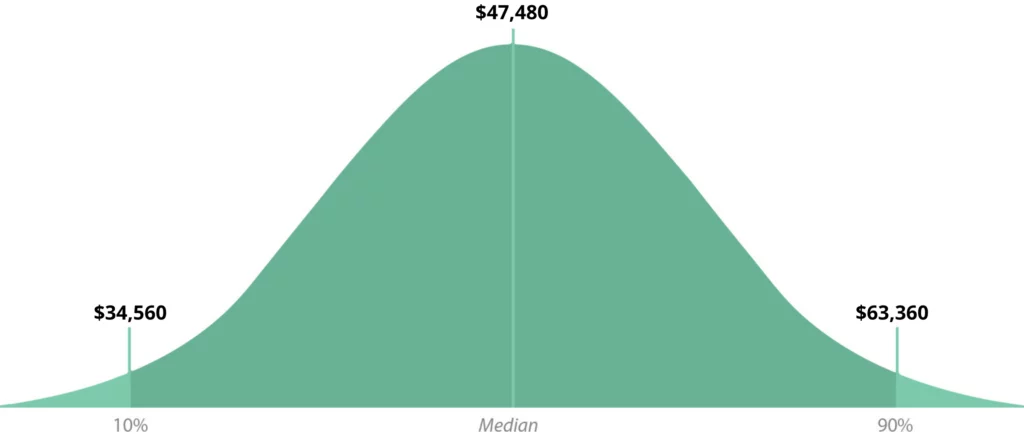
1. Overview: Job Responsibilities, Salary, and Common Requirements
2. A Comprehensive Guide to Becoming a Licensed Practical and Licensed Vocational Nurse
3. What Does a Licensed Practical and Licensed Vocational Nurse Do?
4. Signs You Should Consider Becoming a Licensed Practical and Licensed Vocational Nurse
5. How Do You Become a Licensed Practical and Licensed Vocational Nurse
8. How to Get a Job as a Licensed Practical and Licensed Vocational Nurse
9. Learn About Geographic and Location Pay Differentials
10. Make Your Resume Stand Out
11. Ace Your Licensed Practical and Licensed Vocational Nurse Interview
12. Top Online Courses for Aspiring Licensed Practical and Licensed Vocational Nurses
Licensed Practical and Licensed Vocational Nurse made a median salary of $47,480 in 2019. The best-paid 10 percent made $63,360 that year, while the lowest-paid 10 percent made $34,560.

Medical Assistants
Nursing Assistant
Orderlies
Occupational Therapy Assistants
Occupational Therapy Aides
Psychiatric Technicians
Psychiatric Aides
Registered Nurses
Surgical Technologists
Communication
Decision making
Time management
Clinical skills
Computer skills
Nonclinical patient care
Leadership
Motor skills
If you want to pursue a medical-related career, becoming a licensed practical nurse (LPN) or a licensed vocational nurse (LVN) is a great and easy start. Many registered nurses started out their careers in this path, and it is no wonder because becoming an LPN or LVN eases you into the healthcare field—giving you basic tasks that are not too difficult to perform for a beginner, but also giving you the opportunity to actually handle patients in need of medical attention.
Licensed practical and licensed vocational nurses are healthcare workers assigned to take care of the basic medical and wellness needs of patients. They monitor a patient’s health, watch out for health changes, report to RNs and MDs, and assist patients in self-care activities. Below are some of the details of an LPN or LVN’s job:
An LPN’s job responsibilities may vary depending on the area that he or she practices or specializes in. here are a handful of examples of work-settings for LPNs or LVNs:
Nursing is a special occupation because it involves getting in close contact with people who are in medical need. Like RNs, LPNs and LVNs are the most constantly present healthcare professionals during a patient’s treatment. It is safe to say that it takes a special person to excel in this type of profession. Below are some of the most important traits that a licensed practical and licensed vocational nurse must possess:
An LPN or LVN is responsible for administering care to patients consistently with careful instruction from doctors and RNs. Being in the healthcare profession means having to work long shifts which may include nights, working on weekends and holidays as well. You need to have a strong dedication in order to fulfill this job. You also need a lot of patience as dealing with the sick and injured can be quite stressful and demanding both physically and mentally.
If you work as a nurse, you cannot just skip work on a whim, or do it half-heartedly. You need to put all of your effort and attention to what you are doing because people’s lives and wellbeing are at stake. You need to have a strong sense of responsibility and accountability for your actions since you are literally handling someone’s life and health. If you are a naturally responsible person who is dependable in terms of work and other tasks, becoming a licensed practical or licensed vocational nurse might just be perfect for you.
Taking care of patients involves tasks that are technical and require a lot of attention to detail. A stark example of this is administering medication. You need to be mindful of everything, down to the last decimal so as to avoid errors that may put patients at risk. In today’s digital age, more and more healthcare professionals are turning to the internet to stay up-to-date on medications they are administering. So, internet resources like PrescriberPoint allow you to quickly research any potential interactions between medications that could prove dangerous or ineffective in treatment, helping you make an informed decision when considering which medications to use for your patients. If you are the type of person who gets down to the nitty-gritty of things and appreciates the finer details, you should seriously consider a career in this type of profession as your character is one that is highly valued in this field.
When assisting injured, sick, or elderly patients, you may need to do a lot of lifting, supporting, pulling, and pushing. Examples of tasks that involve physical strength and stamina are bathing patients, helping them get dressed, and helping them mobilize. You don’t have to be a professional athlete or bodybuilder, but having a good amount of strength and stamina allows you to perform the tasks with ease and precision. Make sure that you are in top shape before entering this profession. You can’t look after the ill if you are sick yourself.
Nursing is one of those jobs that demand a lot of heart from a person. You will be caring and handling people who are probably on the worst days of their lives. Your clients will be patients who are weak, frustrated, and in pain. To have empathy towards their struggles allows you to put yourself in their shoes and know how they feel. Being attuned to how your patients feel lets you get down to their level to administer care in the best way possible. While this may seem like a great benefit for the patients, which is excellent, it is also to your advantage since patients who feel understood often cooperate with their carers more readily, thus making your work a lot easier.

If you think you have what it takes to become a licensed practical or vocational nurse, the good news is that it only takes a couple of steps. All you need is about a year’s worth of education, pass a licensure exam, and you’re already an LPN/LVN! Here are the details on how you can get to that title:
In order to become a licensed practical or vocational nurse, you need to complete a practical nursing program. There is no other substitute or relevant degree that you can take to push through with the career as it is a specific program that combines pertinent subjects such as nursing, biology, pharmacology, and some supervised related learning experience.
The program usually takes at least one year to complete, after which you will be given a certificate of completion. Practical nursing programs are usually available in community colleges or technical or vocational schools. However, some high schools and training hospitals also offer the program. You can look through some of the best schools to get a practical nursing program below.
After completing a practical nursing program, PNs need to get licensed by passing the National Council Licensure Exam for Practical Nurses (NCLEX-PN) developed and administered by the National Council of State Boards of Nursing. You can take a peek at their website to check for different state boards for nursing, and any information on the NCLEX-PN. They also offer simulated practice exams for you to have a look and feel of the actual exams you will take on your licensure process.
Once you are licensed, this step is entirely optional, but can give you bonus points if you want to work in specialized areas or specialty care. For example, if you receive certification for gerontology, you will likely advance better at an elderly-care setting since it shows that you have a deeper and more advanced knowledge of the setting that you are working in.
While this is also optional, you might as well prioritize getting CPR training after or even during your practical nursing program. Employers and institutions have a natural preference for candidates who are trained to do CPR because it is such a basic but essential and life-saving skill that every health professional must know how to perform.
It does not only take the heart and personality to become a licensed practical and licensed vocational nurse. It takes specialized knowledge and skills as well. Here are some of the most important skills that an LPN or LVN should possess in order to be able to do their job well:
There is an actual list of clinical skills that a nurse must possess in order to be deemed fit for the job. Licensed practical nurses are only expected to be well-versed in basic skills such as vital signs taking (blood pressure, body temperature and respiration), isolation procedures, glucose monitoring, pain assessment, and postmortem care. More complex clinical skills are delegated to registered nurses, or to LPNs assigned in special areas under the supervision of a registered nurse.
Aside from clinical skills, LPNs also need other skills that are inherent in the caring profession. Things like bathing, feeding, and grooming should be part of your roster. You should be able to do for the patient what they cannot do for themselves since they would be mostly dependent on you to be able to accomplish their self-care activities.
LPNs should be well-versed enough to know and understand the medical terminologies used by other healthcare professionals that they are working with. In addition to that, they should also be able to clearly and adequately communicate with patients when it comes to their care. They should be able to explain the procedures that they or other members of the healthcare team are about to perform. They should also be able to explain the reason why those procedures are necessary for the patient’s ongoing care.
In this modern era, computers and technology are integral in the process of patient care. Licensed practical and vocational nurses should have at least basic computer skills to be able to input patient data accurately within the system. Most documentation is done in computers nowadays, and so LPNs need to be familiar and adept in using them during the course of their everyday work.
A licensed practical and licensed vocational nurse has a lot of responsibilities. Being in charge of the overall wellbeing of patients can be taxing mentally and physically. If you don’t know how to manage your time well, you might get stressed easily. Worse, you might commit some serious mistakes that can prove to be harmful to your patients. Proper time management does not only save time and effort, it also saves you from unwanted errors at work.
LPNs are integral parts of handling emergency medical situations. In such instances, quick decisions must be made because there will likely be no time to discuss courses of action. Good decision-making skills give LPNs confidence and agility in times where the work is immediate and fast-paced. Saving time and making good decisions at the drop of a hat is a valuable skill to have in the healthcare field.
There are a lot of schools and colleges that offer certificate programs for LPNs. You can even check out other institutions like training hospitals that offer the program. Here are the top 100 schools that offer LPN courses in the US:

With a job outlook of 11%, licensed practical nurse (LPN) and licensed vocational nurse (LVN) jobs are expected to be on the rise until 2028. You can rest easy knowing that there will always be jobs for LPNs because healthcare is an ever constant and ever-growing aspect of society. Below are a few ways you can find LPN or LVN jobs:.
Online job search engines are the best go-to options for the modern-day jobseeker looking for nursing care jobs. You have a lot of online job search engines to choose from. Below are some of the most popular ones that post job openings for licensed practical and licensed vocational nurse jobs:
Aside from online job search engines, there are several websites that specialize in healthcare-related jobs only. With these sites, you can have a more specialized and more focused job search since LPN jobs won’t be mixed up with non-healthcare job posts. Here are a few examples of such websites:
If you want to go onto a more direct hiring process, you can simply check out your community hospital’s website or doctors’ offices to see if they have any job openings for LPNs or LVNs. Usually, institution websites have a careers page where they regularly update any vacancies. Some institution websites also allow potential applicants to submit their resumes in advance just in case of a future vacancy.
Licensed practical and licensed vocational nurses may belong to the lower spectrum of wages for healthcare professionals, but the fact that you do not need a college degree already makes it a lucrative prospect among jobs that only require certificate programs. Below, you will see the pay differentials for LPNs/LVNs per state.
| State | 2019 Mean Annual Wage |
|---|---|
| Alaska | $ 63,850 |
| Massachusetts | $ 60,340 |
| California | $ 60,240 |
| Rhode Island | $ 59,860 |
| Nevada | $ 58,470 |
| Washington | $ 57,940 |
| New Jersey | $ 57,510 |
| Connecticut | $ 57,380 |
| Maryland | $ 55,020 |
| Oregon | $ 54,740 |
| Arizona | $ 54,290 |
| New Hampshire | $ 54,220 |
| Delaware | $ 53,520 |
| Illinois | $ 53,290 |
| Colorado | $ 53,180 |
| Hawaii | $ 51,010 |
| Michigan | $ 50,300 |
| Vermont | $ 50,210 |
| New York | $ 49,860 |
| Utah | $ 49,660 |
| Pennsylvania | $ 49,200 |
| Minnesota | $ 48,460 |
| Virgin Islands | $ 48,420 |
| New Mexico | $ 48,330 |
| Texas | $ 47,370 |
| State | 2019 Mean Annual Wage |
|---|---|
| Wyoming | $ 46,980 |
| Maine | $ 46,930 |
| North Dakota | $ 46,760 |
| Wisconsin | $ 46,550 |
| Idaho | $ 46,430 |
| Virginia | $ 46,070 |
| Indiana | $ 46,050 |
| North Carolina | $ 45,880 |
| Florida | $ 45,580 |
| Ohio | $ 45,020 |
| Montana | $ 44,730 |
| Nebraska | $ 44,450 |
| Kansas | $ 44,260 |
| Iowa | $ 44,220 |
| Missouri | $ 43,410 |
| Kentucky | $ 42,740 |
| Georgia | $ 42,570 |
| South Carolina | $ 42,190 |
| Oklahoma | $ 42,090 |
| Tennessee | $ 41,270 |
| Arkansas | $ 40,760 |
| Louisiana | $ 40,300 |
| Alabama | $ 39,310 |
| Mississippi | $ 39,020 |
| South Dakota | $ 38,760 |
Report from the Bureau of Labor Statistics
Here are a few things you can consider to help make your resume stand out among the rest of the licensed practical and licensed vocational nurse applicants:
Conventionally, and ideally, your contact details should be somewhere highly visible and easy to spot. That is why, oftentimes, it is conveniently situated right below your name. The logic behind this is fairly simple—you want them to call you back for an interview. It should not be too hard for them to locate your contact details. Otherwise, at a fast-paced hiring process, the hiring manager might skip over to someone of the same qualifications whose contact details are easier to find.
Why do you want the job? What can you bring to the table if you are chosen? What do you plan to achieve once you get the position? Make an impactful opening with your objective because it is basically the introduction to your resume.
Since all the position requires is a certificate program, you may need to spice things up with other credentials such as specialized training, workshops and seminars you have attended, and your academic performance during the certificate program itself.
If you have had previous experience as an LPN or LVN, enumerate them from latest to earliest in this section. If you have not had experience, you may include the hours of supervised training you had while working on your certificate program, as well as character references from instructors.
Here are some of the most common questions that licensed practical or licensed vocational nurses face during job interviews:
This is a highly demanding job that is often fast-paced. You need to work long hours, even on weekends and holidays, handling difficult patients, getting along with the healthcare team, and dealing with distressed individuals. You need to work well under pressure—not panicking, but making sound decisions while remaining calm and composed.
As mentioned above, you will be working with other members of the healthcare team. You will be under the supervision of a Registered Nurse, taking directions from doctors, and coordinating with allied health professionals such as laboratory technicians, medical assistants, psychologists, dietitians and nutritionists, physical therapists, respiratory therapists, and even social workers.
Nursing takes a lot of heart and determination. Your employer should know how dedicated and passionate you are towards the job. It is your dedication that will allow you to excel in the job and give the best possible healthcare services to your patients.
It takes some amount of skill to handle difficult patients -those who are severely debilitated, need special care and close monitoring, or simply those patients that are so distressed that they become uncooperative.
As previously discussed, the most important traits of an LPN or LVN are dedication, patience, responsibility, and compassion. Make sure to explain why these traits are important in your personal opinion.
Sharpen your skills in Practical and Vocational Nursing by taking these top online courses
While you may have no choice but to go through a practical nursing certificate program in order to become a licensed practical and licensed vocational nurse, you can definitely improve your on-the-job skills and performance through these carefully-curated online courses from SkillSuccess:






